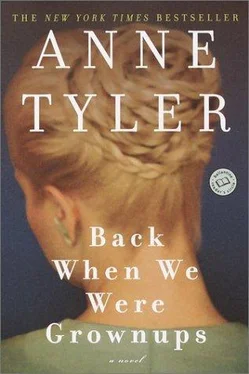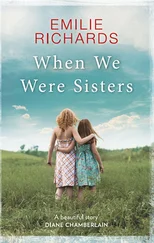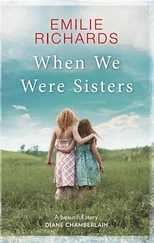Well, no matter, because Patch was finally unfolding herself from the minivan. She slammed the door behind her and said, “Let’s get started, then, if you’re so set on this.”
“Thank you, sweetie,” Rebecca said. “I just know we’ll have a good time today.”
Patch said, “Ha!” and marched off toward the others, leaving Rebecca to trail behind.
The softball game had begun now, at least in a halfhearted way. People were scattered across the meadow seemingly at random, with Rebecca’s brother-in-law and Barry so far off in the outfield that they might not even be playing. The catcher (Biddy) was tying her shoe. The uncle leaned on his cane at an indeterminate spot near third base. Rebecca’s daughter was sunbathing on first, lounging in the grass with her face tipped back and her eyes closed.
As Patch and then Rebecca came up behind home plate, Jeep was assuming the batter’s stance, his barrel-shaped body set sideways to them and his bat wagging cockily. NoNo, on the pitcher’s mound, crooked her arm at an awkward angle above her shoulder and released the ball. It traveled in an uncertain arc until Jeep lost patience and took a stride forward and hit a low drive past second. Hakim, Rebecca’s son-in-law, watched with interest as it whizzed by. (No surprise there, since Hakim hailed from someplace Arab and had probably never seen a softball in his life.) Jeep dropped his bat and trotted to first, not disturbing Min Foo’s sunbath in the least. He rounded second, receiving a beatific smile from Hakim, and headed for third. Third was manned by Biddy’s… oh, Rebecca never knew what to call him… longtime companion, dear Troy, who always claimed it was while he was fumbling a pop-up fly at age five that he first realized he was gay. All he did was wave amiably as Jeep went trundling past.
By that time, Barry had managed to locate the ball. He threw it toward Biddy, but she was tying her other shoe now. It was Patch who stepped forward to intercept it, apparently without effort. Then she turned back to home plate and tagged her husband out.
Patch and Jeep might have been playing alone, for all the reaction they got. Biddy straightened up from her shoe and yawned. NoNo started clucking over a broken fingernail. Min Foo was probably unaware of what had happened, even — unless she’d been able to figure it out with her eyes closed.
“Oh,” Rebecca cried, “you-all are not even trying! Where is your team spirit?”
“For that, we need more than one side,” Jeep said, wiping his forehead on his shoulder. “There aren’t enough of us playing.”
To Rebecca, it seemed just then that there were far too many of them. Such a large and unwieldy group, they were; so cumbersome, so much work. But she said, “You’re absolutely right,” and turned in the direction of the river. “Kids!” she called. “Hey, kids!”
The children were hopping in an uneven line a good twenty yards away, beyond a stretch of buzzing, humming grass and alongside flowing water; so at first they didn’t hear her. She had to haul up her skirt again and slog toward them, calling, “Come on, everybody! Come and play ball! You kids against us grownups!”
Now they stopped what they were doing (some version of Follow the Leader, it seemed, leaping from rock to rock) and looked over at her. Five of the six were here today — all but Dixon, the oldest, who’d gone someplace else with his girlfriend. And then there was Barry’s son, what’s-his-name. Peter. “Peter?” Rebecca called. “Want to play softball?”
He stood slightly apart from the others, noticeably pale-haired and white-skinned and scrawny in this company of dark, vivid Davitch children. Rebecca felt a tug of sympathy for him. She called, “You can be pitcher, if you like!”
He took a step backward and shook his head. Well, no, of course: she should have offered him the outfield. Something inconspicuous. The others, meanwhile, had broken rank and were starting toward her. “Not It, not It,” the youngest child was chanting, evidently confused as to what softball was all about. Patch and Jeep’s three (wouldn’t you know) were vying to be first at bat. “We’ll draw straws,” Rebecca told them. “Come on, everybody! Winning team gets excused from cleanup after lunch.”
Only Peter stayed where he was. He was balanced on a low rock, alert and motionless, giving off a chilling silence. Rebecca called, “Sweetie? Aren’t you coming?”
Again he shook his head. The other children veered around her and plowed on toward the playing field, but Rebecca gathered her skirt higher and pressed forward. Long, cool grasses tickled her bare calves. A cloud of startled white butterflies fluttered around her knees. She reached the first rock, took a giant step up, and leapt to the next rock just beyond, teetering for a second before she found her footing on the slick, mossy surface. (She was wearing rope-soled espadrilles that gave her almost no traction.) So far she was still on dry land, but most of the other rocks — Peter’s included — turned out to be partly submerged. This meant that the children had been disobeying instructions. They’d been warned to stay away from the river, which was unpredictably deep in some spots and wider than a two-lane highway, not to mention icy cold so early in the season.
Peter kept as still as a cornered deer; Rebecca sensed that even though she wasn’t looking at him. For the moment, she was looking at the scenery. Oh, didn’t a river rest your eyes! She sank into a peaceful trance, watching how the water seemed to gather itself as it traveled toward a sharp bend. It swelled up in loose, silky tangles and then it smoothed and flowed on, transparent at the edges but nearly opaque at the center, as yellow-green and sunlit as a bottle in a window. She drifted with it, dreaming. It could have been a hundred years ago. The line of dark trees on the opposite shore would have looked the same; she’d have heard the same soft, curly lapping close by, the same rushing sound farther off.
Well. Enough of this. She tore her gaze away and turned again to Peter. “I’ve got you now!” she told him gaily.
He took another step backward and disappeared.
For a moment, she couldn’t believe what had happened. She just stood there with her mouth open. Then she looked down and saw a turmoil in the water. A small, white, big-eyed face gulping air and choking. A frantic snarl of thin, bare, flailing arms.
She jumped onto the rock he’d been standing on, skidding slightly and bruising an ankle. She plunged in waist deep and gasped. (The water was so cold it burned.) First she grabbed Peter’s wrist but lost it. Then she clutched blue denim. She hitched him up by the seat of his jeans and found the time, somehow, to consider how absurd this must look: a middle-aged woman plucking a boy from a river like a sack of laundry, hoisting him aloft for one split second before her muscles registered his weight and they both went under. But she still had hold of him. She kept her grip. She fought to thrust him above the surface even while she was half sitting on the bottom. Then she was up and struggling shoreward, stumbling and falling and rising and staggering on, hauling him by his armpits. (A good thing he was so undersized or she never could have managed, adrenaline or no.) Between his coughs now he was drawing huge, rough, scraping breaths, and once or twice he gagged. She dragged him in a bobbling way across the rocks to the grass, where she dropped him. She bent double to clear her head and noticed, in that position, how her skirt was streaming with water; so she collected a handful of hem and wrung it out.
The first to reach them was Barry. He pounded up shouting, “Peter! Peter? What in hell were you doing ?” Peter didn’t answer. He was shaking and chattering, huddling into himself on the ground. Barry peeled his own windbreaker off and bundled it around him. Meanwhile Zeb arrived — Rebecca’s brother-in-law. He was followed by the children and then by the rest of the grownups, who slowed to a casual saunter once they saw that things were under control.
Читать дальше












